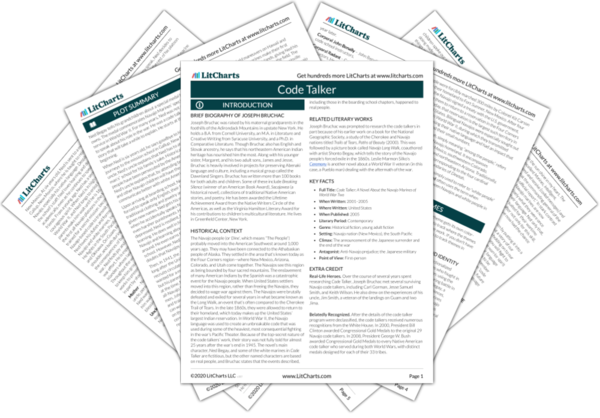Bilagáanaa Quotes in Code Talker
I turned to look up at my uncle's kind face. […] I was frightened by the thought of being away from home for the first time in my life, but I was also trying to find courage. My uncle seemed to know that.
"Little Boy," he said, "Sister's first son, listen to me. You are not going to school for yourself. You are doing this for your family. To learn the ways of the bilagáanaa, the white people, is a good thing. Our Navajo language is sacred and beautiful. Yet all the laws of the United States, those laws that we now have to live by, they are in English."

Unlock explanations and citation info for this and every other Code Talker quote.
Plus so much more...
Get LitCharts A+All through Indian school we had been taught that white men knew everything. That day, for the first time, I realized several things. The first was that bilagáanaas are not born knowing everything. The second was that in many of the most important ways, white men are no different from Navajos. The third? That no matter who they are, people can always learn from each other.
Some of the things those generals wrote made me feel so good that I almost laughed out loud. Remember, grandchildren, like so many other Navajos, I had grown up hearing only criticism and hard words from the bilagáanaas about our people. We Navajos were stupid. We were lazy. We could not be taught anything. We could never be as good as any white man. To hear what was now being said truly made the sun shine in my heart.
The Navajos have proved to be excellent Marines, intelligent, industrious, easily taught to send and receive by key and excellent in the field.
That is what the commanding general of the Sixth Marine Division put in his official report. […] Each Marine division was expected to have at least 100 code talkers.
Although I had changed, the things that had made me feel sad and ashamed when I was a child in boarding school had stayed the same. It didn’t matter that I had fought for America. It didn’t matter that I had made white friends who would have sacrificed their lives to save me when we were at war. In the eyes of those prejudiced bilagáanaa in that bar, I was just another stupid Navajo.
But I did not walk away thinking that things were hopeless. […] I had learned to be self-confident as a Marine, to believe that I could succeed even in the hardest battle.
It was not easy and I did not do it quickly. For one thing, I still had to be healed. Those of us who came back to Dinetah from the war were all wounded, not just in our bodies, but in our minds and our spirits. You know that our Navajo way is to be quiet and modest. So when we Navajo soldiers came back, there were no parties or big parades for us as there were for the bilagáanaa G.I.s in their hometowns. We Navajos were just expected to fit back in.












